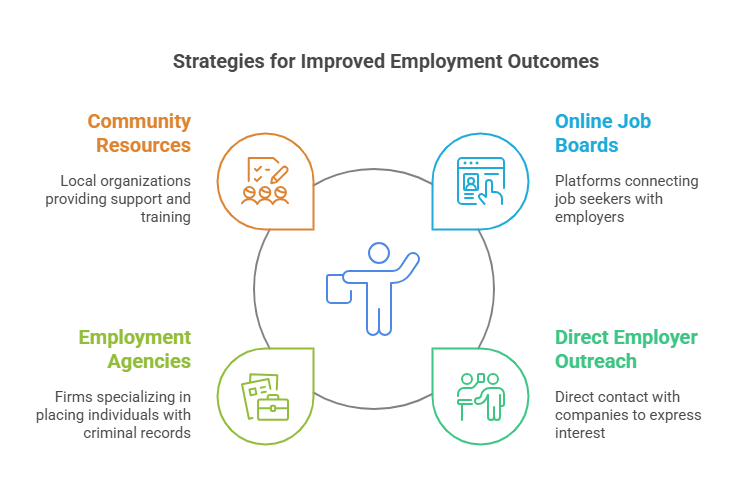Finding a job can be challenging, especially with a criminal record. Many face rejections and biases, making re-entry into society difficult. This guide provides resources and guidance for job seekers with criminal records, helping them navigate the job market and secure employment.
Re-entering the workforce after a criminal conviction is a significant hurdle. However, many resources and strategies can help individuals with criminal records find meaningful employment. By understanding the legal landscape, preparing effectively, and utilizing available support, you can overcome these challenges and achieve your career goals.

Understanding the Legal Landscape
Navigating the job market with a criminal record requires understanding the legal protections and opportunities available. Laws and policies supporting fair hiring practices can significantly impact your job search. Knowing your rights and the resources available can help level the playing field.
EXPERT INSIGHT: For those who must go through a background check, reopening a book you believed was sealed away may seem familiar. Finding the appropriate candidate for the right job is merely one of our objectives as HR specialists. Building a trust-based work ecosystem is our ultimate objective. Therefore, we ought to support making "second chances" more commonplace. Let's lead with empathy and honesty in addition to technical know-how. Why? Because true leadership is not about closing doors, but about opening them. - Charm Paz, CHRP
Ban the Box Initiatives
Ban the Box laws prohibit employers from asking about criminal records on initial job applications. This initiative ensures that job seekers are judged first on their skills and qualifications rather than their past. By delaying questions about criminal history, Ban the Box laws provide a fairer chance for individuals to demonstrate their suitability for a position. Understanding these laws can help you approach your job search with more confidence.
Fair Chance Hiring Policies
Fair Chance Hiring policies encourage employers to consider job seekers with criminal records more fairly. These policies promote non-discriminatory practices and help expand employment opportunities for those with past convictions. Fair Chance policies aim to reduce recidivism and support rehabilitation by creating a more inclusive hiring process. Knowing which companies follow these policies can guide your job search efforts.
Expungement and Record Sealing
Expungement and record sealing are legal processes that can remove or hide certain criminal records from public view. These procedures can significantly improve job prospects by allowing individuals to move forward without the stigma of a past conviction. Understanding the criteria and process for expungement or record sealing in your area. Legal aid organizations can provide guidance and support in navigating these procedures.
Pre-Employment Preparation
Preparation is vital in overcoming employment barriers. Building a solid resume, honing interview skills and networking can enhance your job search. Each element is crucial in presenting yourself as a capable and committed candidate.
Resume Building
Focus on your skills and accomplishments. Highlight what you’ve achieved and how you’ve grown. Be honest about your criminal record if it comes up, and explain what you’ve learned from the experience. Craft a resume emphasizing your strengths and the value you can bring to a potential employer. Consider seeking professional help to refine your resume.
Interview Skills
Prepare to discuss your past if asked. Emphasize your rehabilitation and personal growth. Show how you’ve changed and why you’re a good fit for the job. Practice common interview questions and responses with a friend or mentor. Confidence and honesty are crucial to making a positive impression during an interview.
Networking
Connect with support groups and organizations that help people with criminal records. Build relationships with potential employers through networking events and job fairs. Networking can open doors to job opportunities that might not be advertised publicly. Leverage online platforms like LinkedIn to expand your professional connections.

Job Search Strategies
A targeted job search strategy can significantly improve your employment outcomes. Knowing where to look and how to approach potential employers can increase your chances of success. Utilize various job search methods to maximize your opportunities.
Online Job Boards
Look for job boards that specialize in fair chance hiring. These platforms connect employers willing to hire individuals with criminal records. Regularly check these boards for new listings and apply promptly. Tailor your applications to each job to highlight your relevant skills and experience.
Direct Employer Outreach
Research companies with inclusive hiring practices. Contact them directly to express your interest and qualifications. Craft personalized cover letters that explain why you’re a good fit for their team. Being proactive can demonstrate your enthusiasm and commitment.
Employment Agencies and Staffing Firms
Find agencies and firms that specialize in placing individuals with criminal records. They can be a valuable resource in your job search. These agencies often have established relationships with employers and can advocate on your behalf. Take advantage of their expertise and support.
Community Resources
Many local organizations offer job placement assistance for individuals with criminal records. These can include workshops, training programs, and one-on-one support. Utilize these resources to improve your job search skills and increase your employment prospects. Community organizations can also provide valuable networking opportunities.

Organizations and Programs for Job Seekers with Criminal Records
Several organizations and programs are dedicated to supporting job seekers with criminal records. These resources can provide training, advocacy, and direct job placement assistance. Knowing where to find help is a crucial step in your job search.
National Organizations
The National H.I.R.E. Network
Provides resources, training, and advocacy for job seekers with criminal records. They offer a wealth of information to help navigate the job market and connect with potential employers. Visit their website for more details. The National H.I.R.E. Network also provides support in understanding your legal rights.
Center for Employment Opportunities (CEO)
Offers transitional jobs and support services to help individuals re-enter the workforce. They provide on-the-job training and work readiness programs to build confidence and skills. More details can be found on their website. CEO’s programs are designed to offer immediate employment opportunities while promoting long-term career success.
Local Organizations
Research and list relevant organizations in your area. Specify the types of support they offer, such as job training, placement, and mentorship. Local organizations often have a deeper understanding of the community’s needs and can provide tailored assistance. Connecting with these groups can enhance your job search efforts.
Government Programs
Mention any federal or state programs aimed at helping individuals with criminal records find employment. These programs often provide job training, placement services, and other forms of support. Explore opportunities available in your area to take advantage of government resources. These programs can be a valuable part of your job search strategy.
Additional Support
In addition to job search strategies and organizations, additional support can enhance your employment prospects. Legal aid, career counseling, and mentorship are vital resources that can provide guidance and assistance. Along the journey, these tools offer emotional support and encouragement in addition to assisting people in navigating the challenges of reentering the labor. Creating a solid support system can increase self-esteem, prepare you for the workforce, and lead to new opportunities. Job seekers with criminal records can obtain the resources and direction they need to use their past as a springboard for a better future by requesting these services.
Legal Aid
Seek assistance for expungement or record sealing to improve your employment chances. Legal aid organizations can guide you through the process and help you understand your rights. Clearing your record can open up new job opportunities and reduce barriers to employment. Contact local legal aid offices for support.
Career Counseling and Training Programs
Enroll in programs to gain new skills and qualifications that make you more competitive in the job market. Career counseling can help you identify your strengths and find suitable job opportunities. Training programs can provide certifications and skills that are in demand. Utilize these resources to enhance your employability.
Mentorship
Connect with mentors who have successfully re-entered the workforce. Their guidance and support can be invaluable. Mentors can provide advice, encouragement, and networking opportunities. Look for mentorship programs through local organizations and online platforms.
Conclusion
Finding a job with a criminal record is challenging but not impossible. You can overcome these barriers by understanding the legal landscape, preparing effectively, and utilizing available resources. Stay encouraged and keep pushing forward. Your persistence and effort will pay off.
Recap the key takeaways and resources provided in this guide. Offer encouragement and hope to job seekers, emphasizing that support is available. Perseverance and determination are crucial to overcoming employment barriers. Remember, many have successfully re-entered the workforce, and so can you.

GCheck Editorial Team
Meet the GCheck Editorial Team, your trusted source for insightful and up-to-date information in the world of employment background checks. Committed to delivering the latest trends, best practices, and industry insights, our team is dedicated to keeping you informed.
With a passion for ensuring accuracy, compliance, and efficiency in background screening, we are your go-to experts in the field. Stay tuned for our comprehensive articles, guides, and analysis, designed to empower businesses and individuals with the knowledge they need to make informed decisions.
At GCheck, we're here to guide you through the complexities of background checks, every step of the way.






